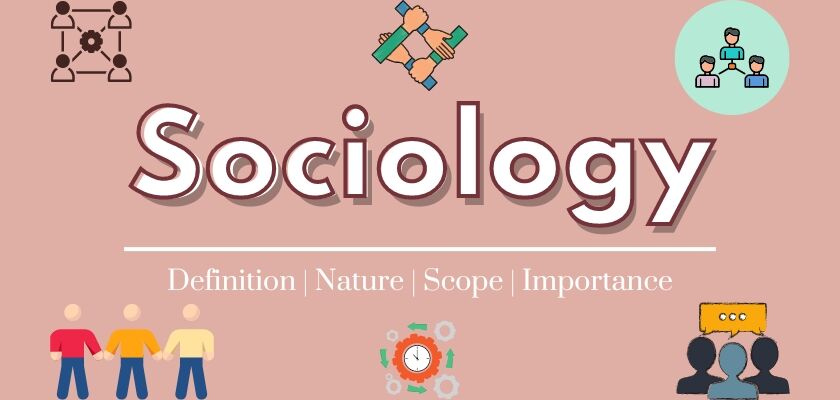French sociologist Auguste Comte first coined the term ‘Sociology’ in 1839. The word originated by combining the Latin word ‘Socioous’ and the Greek word “Logos’. The meaning of ‘Socious’ is society, and the meaning of ‘Logos’ is the study or science. Thus, the treatise that discusses society is called sociology. Sociology has been defined in a number of ways by different sociologists. No single definition has yet been accepted as completely satisfactory. Definitions of Sociology by different authors are given below:
What is Sociology

According to Durkheim, “Sociology is the science of social institutions.”
According to Maclver and Page, “Sociology is the only science that discusses the social relationship of man in society.”
According to L.S. Ward and W.G. Summer, “Sociology is the science of society.”
According to F.E. Meril, “Sociology is the science of human group relationship.”
Max Weber states, “Sociology is the study of social action.”
Kingsley Davis states, “Sociology is a general science of society.”
Morris Ginsberg states, “Sociology is the study of human interaction and interrelations, their condition and consequences.”
Professor Giddings states, ”Sociology tells us how to become what we want to be.”
However, from the above discussion, we can say that sociology concerns man, his social relation, and his society.
Nature of Sociology
Sociology has its unique characteristic. It is different from other science in certain respects. The main characteristic of sociology are given below:
- Sociology is an independent science: Sociology is an independent science. It is not studied as a branch of any other science like philosophy or politics or history. It has its own field of study, boundary, and method.
- Sociology is a social science and not a physical science: Sociology belongs to the family of social science and not to the family of physical sciences. As a social science, it studies man, his behavior, social activities, and social life. As a member of the family of social science, it is related to other social science like history, political science, economics, anthropology, etc.
- Sociology is a categorical and not a normative discipline: Sociology “confines itself to statement about what is not, what should be or ought to be.” Sociology is necessarily silent about questions of value. It does not make any value judgments. Its approach is neither moral nor immoral. It is ethically neutral.
- Sociology is a pure science and not an applied science: The difference between pure science and applied science is that pure science is the acquisition of knowledge, and applied science is to apply the acquired knowledge into life and to put it to use, i.e. physics is pure science and engineering is it’s applied. Sociology is pure science because the aim of sociology is the acquisition of knowledge about human society, not the utilization of that knowledge. Sociologists never determine the question of public policy and don’t recommend legislation and what laws should be passed.
- Sociology is a relatively abstract science and not a concrete science: This does not mean that sociology is an art, unnecessarily complicated, and not a science. It only means that sociology is not interested in the concrete manifestation of human events. It is concerned with the form of human events and their patterns. For example, sociology is not concerned with wars and revolution but with war and revolution as social phenomena or social conflict.
- Sociology is a generalizing and not an individualizing science: sociology deals with the general laws or principles about human interaction and association about the nature, form, content, and structure of human groups and societies. It does not study every event that takes place in society.
- Sociology is general science and not a special social science: The area of inquiry of sociology is general and not specialized. It is concerned with human interaction and human life in general. For example, economics specializes study of economic activities, and political science concentrates on political activities. But sociology studies human activities in a general way.
- Sociology is both a rational and an empirical science: Empiricism and rationalism are the two approaches to scientific knowledge. Empiricism emphasizes experiences and the facts that result from experimentation and observation, and rationalism stresses reason and theories that result from logical inference. The empiricist collects facts, and the rationalist co-ordinate and arranges them. Theories and facts are required in the construction of knowledge. In sociological inquiry, both are significant.
It is clear from the above that sociology is an independent, social, categorical, pure, abstract, generalizing, rational, empirical, and general social science.
Scope
The scope of sociology is defined here:
- Social activities: Sociology studies social activities through which man’s group behavior is expressed. It studies human values, social interest, fellow feelings, affections and inspiration, natural expression of sorrow and happiness, and cooperation.
- Social change: Sociology aims to improve man’s adjustments to life by developing knowledge concerning social phenomena and dealing effectively with social problems.
- Social control: The task of sociology is to discover guiding principles through various processes.
- Social stratification: The stratifications of sociology are primitive society and modern society.
- Social family: The child experiences love, authority, directions, protections, setting of examples, and ideals. As he grows older, imitation of parental action and exposure to their suggestions lead him to form habits that affect his social life more profoundly than he will recognize until many years, if at all.
- Social religions: Social religion aims to teach people to accept advanced cultural and social change
- Social political activities: Sociology studies social, political activities.
- Social industrial functions: Sociology studies social industrial functions, such as the purpose of mills, factories, etc., for the country’s development.
- Social psychological functions: It is another important stream. So, any attempts to analyze social phenomena must be based on the close examination of the psychological character of an individual.
- Demographic society: Sociology studies the power of the man in a demographic society.
- Historical society: Society studies the history of society.
- Educational society: Sociology studies collect information about social institutions and explain the aims and trains of those institutions.
- Social problems: Sociology studies the problems of society, such as juvenile delinquency.
Importance of Sociology
In modern times, the importance of the study of sociology is increasing day by day. The importance of sociology is as follows:
- Study of society and the social nature of a man: Before the emergence of sociology, there were no systematic and scientific ways of studying human society with all its complexities. Sociology has made it possible to study scientifically. Sociology enters deep into the nature of a man. It tells us why man is a social animal and lives in groups, communities, and societies. It examines the relationship between the individual and society and the impact of society on man.
- Help us to understand not only our society and society’s action but also others’ society: The study of sociology assists an individual in understanding himself, his capacities, talents, and limitations. It enables him to adjust himself to the environment. Again in a huge industrialized society, our experience is comparatively limited. We rarely have an idea of other societies. Sociology helps us acquire knowledge of other societies’ motives, aspirations, status, customs, culture, institutions, traditions, occupations, etc.
- Significant effect in enriching culture: Sociology has given training to us to have a rational approach to questions concerning ourselves, our religion, customs, institutions, values, ideologies, etc. it has made us more objective, rational, critical, and broad-minded. It helps to overcome prejudices, misconceptions, and religious hatred.
- Help us to study great social institutions and the relations of individuals of each one of them: The home and family, school and education, the stage and government, industry and work, religion and morality, marriage and family, property and government, etc are the main institutions by which our country functions. More than the condition of our lives in countless ways, knowledge of sociology may help to strengthen them to serve man better.
- A greater role in underdeveloped countries: Sociologists have drawn the attention of economists regarding the social factor that has contributed to the economic backwardness of a few countries. Economics have now realized the importance of sociological knowledge in analyzing the economic affair of a country.
- Solving social problems and necessary for understanding and planning of society: The present word is best with many problems such as poverty, beggary, unemployment, overpopulation, crime, juvenile delinquency, gambling, community disorganization, family disorganization, etc. Sociology provides an analysis of these problems to solve them. Again social planning has been made easier by sociology. Sociology is a vehicle of particular reform and social reorganization.
- Utility of sociological techniques and keep us up to date in a modern social situation: The techniques developed by sociologist and other social scientists, such as ‘social survey’ has become an essential part of market research and political polling. Sociology makes us more alert toward the changes and developments around us. As a result, we learn about our changing roles, expectations, and responsibilities.
- Help government to promote the welfare of the tribal people: Not only civilized societies but even tribal societies are faced with several socioeconomic and cultural problems. Studies conducted by sociologists regarding tribal societies and problems have helped many governments undertake various welfare measures to promote the welfare of the tribal people.
Finally, we can say according to Professor Giddiugs, “Sociology tells us how to become what we want to be.”
In conclusion, it can be said that the question of the “Importance of sociology” is not a question of whether or not we should study a subject. But it is a simple question of how it is actually to be used.
FAQ
01. Who was the Father of Sociology?
Auguste Comte, in full Isidore-Auguste-Marie-François-Xavier Comte, (born January 19, 1798, Montpellier, France—died September 5, 1857, Paris), French philosopher was known as the founder of sociology and of positivism.
02. Who First Coined the word Sociology?
French sociologist Auguste Comte first coined the term ‘Sociology’ in 1839.
03. Who is the author of “What is Sociology?”?
Norbert Elias is the author of What is Sociology. This book was published in German in 1970 under the title Was ist Soziologie?, What is Sociology? explores the evolution and its impacts on social and historical development and the implications thereof. It evaluates modern society’s interdependence during the civilizing process.

